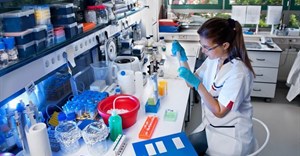
Subscribe & Follow
Treating cancer with silver-based drugs is showing promising results
Research, published in Biometals, shows UJ3 to be as effective against human oesophageal cancer cells, as a widely-used chemotherapy drug in use today. Oesophageal cancer cells are known to become resistant to current forms of chemotherapy.
“The UJ3 complex is as effective as the industry-standard drug Cisplatin in killing cancer cells in laboratory tests done on human breast cancer and melanoma, a very dangerous form of skin cancer, as well,” says Professor Marianne Cronjé, head of the Department of Biochemistry at the University of Johannesburg.
“However, UJ3 requires a 10 times lower dose to kill cancer cells. It also focuses more narrowly on cancer cells, so that far fewer healthy cells are killed,” she says.
Fewer side effects
Apart from needing a much lower dose than an industry standard, UJ3 is also much less toxic.
“In rat studies, we see that up to three grams of UJ3 can be tolerated per one kilogram of bodyweight. This makes UJ3 and other silver phosphine complexes we have tested about as toxic as vitamin C,” says Professor Reinout Meijboom, head of the Department of Chemistry at the University of Johannesburg.
If UJ3 becomes a chemotherapy drug in future, the lower dose required, lower toxicity and greater focus on cancer cells will mean fewer side effects from cancer treatment.
Powerhouse pathway to neat cancer cell death
UJ3 appears to target the mitochondria, resulting in programmed cell death to kill cancer cells – a process called apoptosis. When a cancer cell dies by apoptosis, the result is a neat and tidy process where the dead cell’s remains are “recycled”, not contaminating healthy cells around them, and not inducing inflammation.
Certain existing chemotherapy drugs are designed to induce apoptosis, rather than “septic” cell death which is called necrosis, for this reason.
Cancer cells grow much bigger and faster, and make copies of themselves much faster, than healthy cells do. In this way they create cancerous tumours. To do this, they need far more energy than healthy cells do.
UJ3 targets this need for energy, by shutting down the “powerhouses” of a cancer cell, the mitochondria.
The complex then causes the release of the “executioner” protein, an enzyme called caspase-3, which goes to work to dismantle the cell’s command centre and structural supports, cutting it up for recycling in the last stages of apoptosis.
Unusual compounds
UJ3 complex and the others in the family are based on silver. This makes the starter materials for synthesising the complex far more economical than a number of industry-standard chemotherapy drugs based on platinum.
“These complexes can be synthesised with standard laboratory equipment, which shows good potential for large scale manufacture. The family of silver thiocyanate phosphine compounds is very large. We were very fortunate to test UJ3, with is unusually ‘flat’ chemical structure, early on in our exploration of this chemical family for cancer treatment,” says Meijboom.
Research on UJ3 and other silver thiocyanate phosphine complexes at the University is ongoing.
The research was funded by the Technology Transfer Office of UJ, the National Research Foundation of South Africa, and the Technology Innovation Agency of South Africa.













